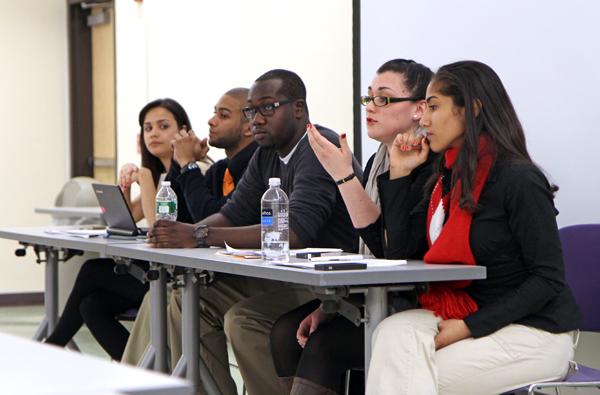
The legal status of prostitution was discussed by members of two of Binghamton University’s Greek Life organizations Wednesday evening in the Old University Union.
Three members of Chi Upsilon Sigma National Latin Sorority Inc. and two members of MALIK Fraternity Inc. participated in a panel that discussed not only the advantages and disadvantages of legalizing prostitution, but the circumstances surrounding prostitution and how it is viewed in the United States.
The panel was moderated by Eileen Nuñez, president of Chi Upsilon Sigma; Monica Morales, vice president and treasurer of Chi Upsilon Sigma; Maria Gil, secretary and historian of Chi Upsilon Sigma; Kwame Dabreo, a member of MALIK; and Daniel Richmond, central activities director for MALIK.
The discussion began with an examination of negative societal perceptions of prostitution and the root causes of these beliefs.
“I think the negative connotation is due to the way culture portrays it,” an audience member said. “I think that comes from religion, how it is portrayed Biblically.”
Further discussion focused on differences between the concepts of “legalizing” prostitution and “decriminalizing” it, and on the potential pros and cons of each policy.
“I don’t know if it should be legal, but I think it should be decriminalized,” another audience member said. “There’s a difference between it being controlled by the police and you not being able to get in trouble for it.”
The panelists raised examples of other countries where prostitution is legalized or decriminalized. They noted that strict regulations concerning sexually transmitted diseases apply to sex workers in Australia and that HIV and AIDS rates are exceptionally low among Australian sex workers. Such statistics are a key argument for legalization, according to the panelists.
Others argued against the legalization of prostitution.
Morales countered arguments that legalizing prostitution could increase government revenues by suggesting that prostitution already produces a good deal of government revenue from criminal fines levied against both the prostitute and client when arrests are made.
“I personally think that government makes a lot more money without it being legal,” she said.
Morales posed the question to the audience of whether prostitution is a victimless crime.
“What defines consent, that’s a main issue,” Morales said. “They’re saying OK to it to have sex, but it’s still a crime, prostitutes can get arrested, but they’re consenting. Should they be arrested for something they’re consenting to?”
Gil argued that prostitution is a choice.
“You choose to do it,” Gil said. “I understand there are certain circumstances, once you’re in it, it’s hard to get out, but it starts as a choice. You make that, now you have to deal with the consequences. The pro is that you can choose it, the con is that it can harm you.”
A third audience member also suggested that legalizing prostitution could result in an increase of human trafficking of sex workers into the United States from outside countries.
“I feel that [legalizing prostitution] would be detrimental for sex trafficking in the U.S,” she said. “The lines [between prostitution and trafficking] would be blurred. It would increase the number of victims.”
By the end of the evening, both the panelists and audience members acknowledged that there existed both societal advantages and disadvantages to legalizing or decriminalizing prostitution. They were largely in agreement though that public perception of the industry as “dirty” or “sinful” is an anachronism from bygone times and that Americans need to look at the issue more critically.


